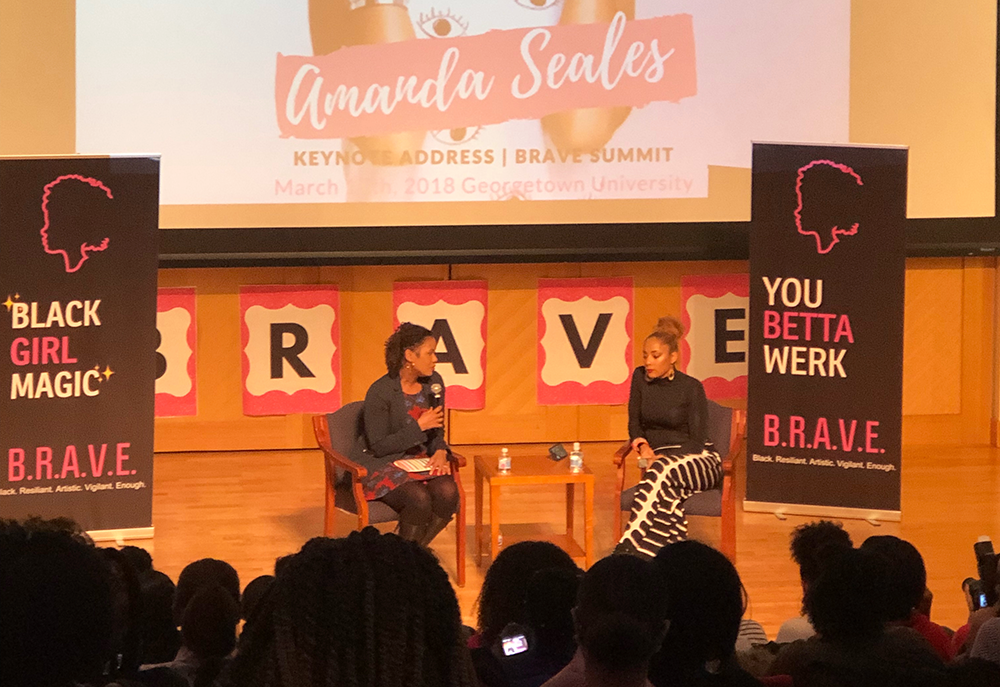Black women must actively work to create spaces to promote their creative work, urged actress and comedian Amanda Seales at her keynote address for the 2018 BRAVE Summit, an event created in 2015 to provide a platform to bring black women to the forefront of Georgetown’s campus.
The event, which featured a conversation between Seales and Soyica Colbert, associate professor of African American Studies and Theater and Performance Studies, drew on Seales’ experiences as a black woman in the entertainment industry to expose the challenges often faced by black women artists. Seales is also currently working on a podcast, “Small Doses,” and had a recurring role in the HBO show “Insecure” as Tiffany, who is known for her “picture-perfect” marriage.
The BRAVE Summit was founded by three Georgetown alumnae, Alexis Oni-Eseleh (COL ’16), Bserat Ghebremicael (MSB ’17) and Candace Millner (MSB ’16), with the goal of empowering black women.
Seales began her speech by reflecting on her early years as an artist while in high school. As a student at Dr. Phillips High School in Orlando, Fla., which has graduated notable entertainers like DJ Khaled and Luis Fonsi, she became involved in the arts and realized that she wanted to pursue a professional career in an art field.

“In high school, it was made clear to me that you can make a real career out of the arts, as long as you understand that there is a true business acumen involved to be a creative,” Seales said.
When Seales began working in a creative career, she was reminded of advice that she received, that there is an artistic side and business side to every profession. To be successful, one must understand all parts of the work, Seales said.
“Every job has three sides: the money, the people, the content,” Seales said, clarifying that a reasonable job tends to offer two out of the three. “I have lived by that.”
For Seales, remaining true to the art that she wanted to produce has affected many of her business decisions, most recently her decision to not sell her show, “Smart, Funny and Black,” to television networks. She ultimately decided that she wanted to be in total control of the production of the show.
“To sell it to a network at this point, I’m selling away the heart of the show, because no matter what, I’m going to now be an employee,” Seales said. “Especially with a product that is so 100 percent innately black, you don’t want to give that to someone that doesn’t want that to see that thrive.”
Part of Seales’ reluctance to sell her show to networks comes from a desire to protect black art and culture from being overly consumed and commodified, which frequently happens, she said.
Seales compared her artistic work to the fictional rare natural resource “vibranium” from the film, “Black Panther,” which has set box office records while casting black actors in lead roles.
“Black culture has been commodified, appropriated and consumed in so many different ways and so many different facets that I’m very protective of that and I’m very protective of what I’m giving to that,” Seales said. “There is no network that has approached me that I felt would be protective of the growing and glowing powers of my ‘vibranium.’”
Protecting black culture in the arts is crucial, Seales said, noting that for this to happen, creators need to forge their own spaces and platforms to express themselves. By creating these platforms and creating room for dialogue about their work, black women are able to create a space that is expressive of black culture, according to Seales.
“A lot of times, we don’t tell each other stuff because we don’t want to offend each other, or we don’t want to look a certain way, or we don’t want to bring another black woman down,” Seales said. “But me telling you something as a way black women can improve is not bringing you down.”
Ultimately, the only way that the greater public will appreciate black culture for what it is will be by black creators publishing their work, Seales said.
If black creators don’t share their own work, then no one will, Seales said.
“Make your own s–t,” Seales said. “I don’t just mean make your art; I mean: You have to make your own spaces for that art to exist; you gotta work with other people to create, because we’re never considered, except for by us.”



















